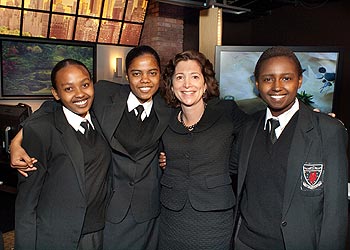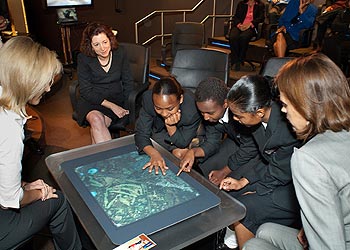NEW YORK, Sept. 22, 2009 — In an opening plenary session today at the annual Clinton Global Initiative meeting, three young women from Kenya took the stage in front of world leaders such as Presidents Barack Obama and Bill Clinton to share their story of social and economic empowerment.

September 21, 2009
Khadija Abdulla Said, Caroline Macharia and Mary Mwende pose with Microsoft’s Pamela Passman during their trip to New York City this week to attend the Clinton Global Initiative’s fifth annual meeting.
In a video shown during the session, one of the girls, Khadija Abdalla Said, told how her life has been changed by a groundbreaking program, funded and supported by individuals and companies around the world.
“Nothing is impossible. I really can see a bright future … I don’t think anything can stop me,” she said.
The young women came to New York this week as part of a program called Global Give Back Circle, founded by international banking consultant Linda Lockhart in 2006 to help disadvantaged girls further their education and improve their circumstances.
Microsoft is a stakeholder in the program, having provided funding and donated technology for a computer lab in Kenya. Women working for Microsoft in Africa also volunteer to act as mentors for the students.
Today’s session marks an anniversary of sorts for Microsoft’s involvement in the program, which came about at last year’s Clinton Global Initiative annual meeting when Lockhart met with Microsoft for the first time.
“After meeting with Linda, it quickly become apparent that Microsoft could support this fantastic initiative by mobilizing resources across the company and enabling our people to bring together their passions for technology and community,” says Pamela Passman, Microsoft’s corporate vice president for Global Corporate Affairs. “The Clinton Global Initiative is very good at bringing diverse people and organizations together, in an environment where they can connect and work to deliver change.”
Passman says she was especially moved by a unique element of the Global Give Back Circle — its commitment to higher education. Soon after founding the program, Lockhart realized that simply graduating from high school is not enough to help young women in Kenya to lift themselves from the cycle of poverty, so she works to help the girls complete their education, a key element to building a successful future.
“A smart young girl in Kenya can have access to very good university-level education, as well as a number of trade programs,” Lockhart says. “Unfortunately, they typically must wait several months before they begin their studies. For poor students who qualify for the government university loan program, there is a required 22-month gap between high-school graduation and university.”
Lockhart says this is a crucial time for Kenyan teens. Some of the country’s prestigious high schools provide a limited number of places for disadvantaged girls from around Kenya. It is a four-year boarding school where they receive shoes, clothes, food and a safe environment to learn.
As they leave high school, however, they literally leave their shoes behind for other girls to use. Many of these girls return in bare feet to impoverished neighborhoods, and many never return to school. With their high-school education only providing enough to qualify for menial jobs, many girls slip into street life and miss the opportunity to pull themselves into a better social position.
“All of the hard work and charitable resources that enabled a girl to graduate high school become marginal investments unless she is able to complete an educational process that gives

September 21, 2009
The girls explore a map using Microsoft Surface technology during a visit to the Microsoft Envisioning Center in New York. Pamela Passman (left) and Linda Lockhart (right) look on.
her a chance to claim financial and societal independence,” Lockhart says.
To illustrate her point, Lockhart uses the shoes as a symbol to explain the unique approach taken by her organization — a mentorship program that leads the girls through a five-step process until they complete their education and ultimately, become mentors themselves.
“The ‘circle’ concept represents a continuous cycle, where these girls give back to the girls who come after them,” she says. “The girls who literally walk in their shoes.”
After last year’s Clinton Global Initiative meeting, Lockhart secured $350,000 funding to help send nearly three dozen girls to college. Shortly thereafter, Microsoft followed with a pledge to build a technology lab in Kenya, to help sharpen the girls’ computing skills and give them a safe place to further their development during the waiting period.
“I remember when I saw the computers for the first time: proper computers,” Abdalla says. “It feels great.”
The Microsoft Learning Lab, which was launched in April at the Starehe Girls Centre in Kenya, allows the girls to obtain Microsoft Office Certification and run a profit-based business during the nearly two-year break. In addition, a special dormitory was created adjacent to the lab in Starehe for at-risk girls.
“Instead of living in marginalized circumstances for 22 months, the girls are in a safe environment and their minds continue to grow and develop,” Lockhart says. “These girls are now able to take advantage of the gap period between high school and university to gain critical technology skills.”
In addition to the technology program, as part of the Give Back Circle’s commitment to mentorship, established professional women from Africa, the United States, Great Britain and other locales keep in frequent contact.
“I communicate to my mentor and she advises me,” says Abdalla. “It’s a cool relationship — it feels good that you have someone who is miles away who you can feel free to talk to.”
The mentors encourage the girls not only to help in their studies, but to instill an ethic of giving back to the community on their own. In the video shown today at the plenary session, the girls can be seen visiting elderly residents of their towns, and describing their efforts to collect clothing for the needy.
“Our mission is to harness the talents of women globally, to transition disadvantaged girls out of the circle of poverty and into a circle of social participation, contribution, fulfillment and independence,” Lockhart says.
With support from Microsoft, ATEbank Greece, Equity Bank Kenya, and several other organizations, the Global Give Back Circle is transitioning its first class of 35 young women from high-school graduation through college and on to employment and global citizenship. The three students who took the stage at today’s event are part of that first class.
Passman, who also attended today’s plenary session, says, “It’s hard to express how it feels to see these girls standing here today, smart, happy, confident, and realize how much brighter their future can be because so many people came together and invested their time and resources to make this program happen.”
And while the executives, celebrities and others on hand today celebrate the accomplishments made by the program so far, for the 160 women who volunteer time and talent to ensure that the Global Give Back Circle makes a difference, today’s recognition is not so much an achievement as a milestone. With costs of about $10,000 (U.S.) per girl — to totally transition her through the 22-month gap period and a four-year college degree — Lockhart is looking to raise $1 million to keep the program moving.
“We have 42 more girls graduating next year, 29 the following year and another 29 the year after that,” she says. “We’re only just beginning.”
To learn more about the Global Give Back Circle and how you can help, visit http://www.globalgivebackcircle.org/. For more information about Microsoft’s global citizenship programs, visit http://www.microsoft.com/citizenship.




